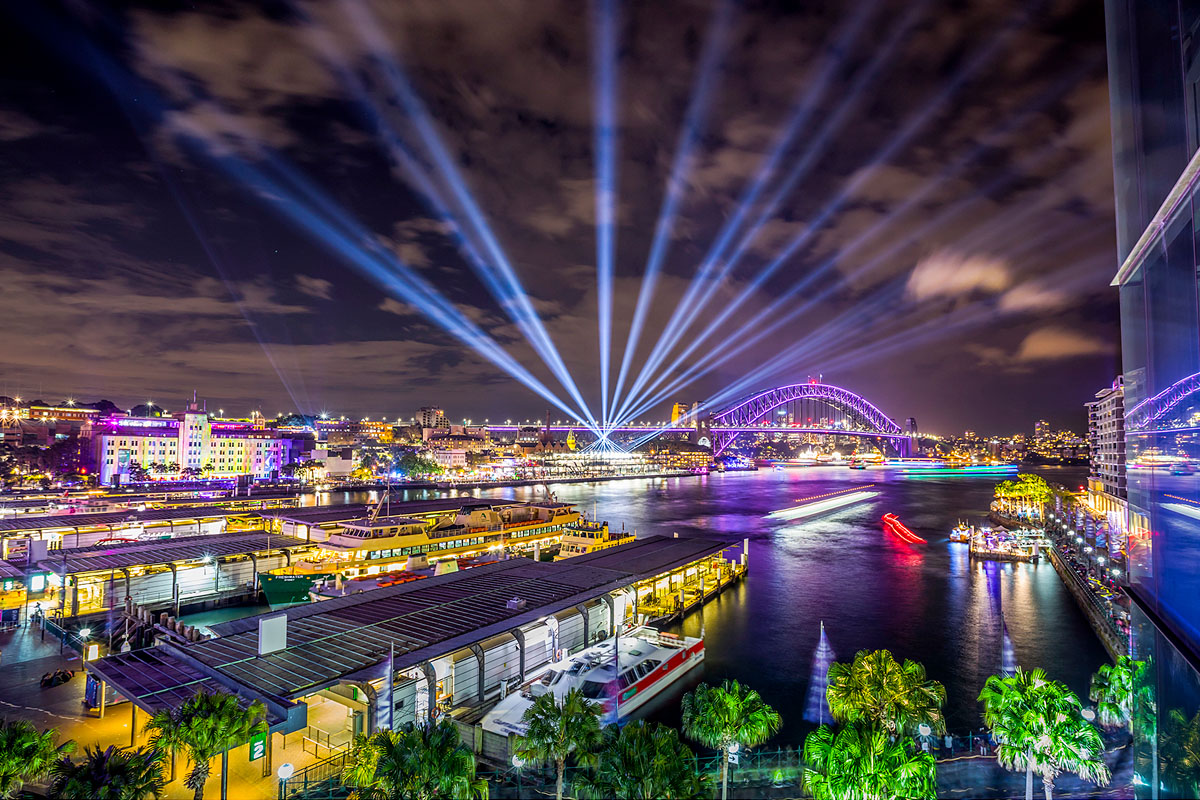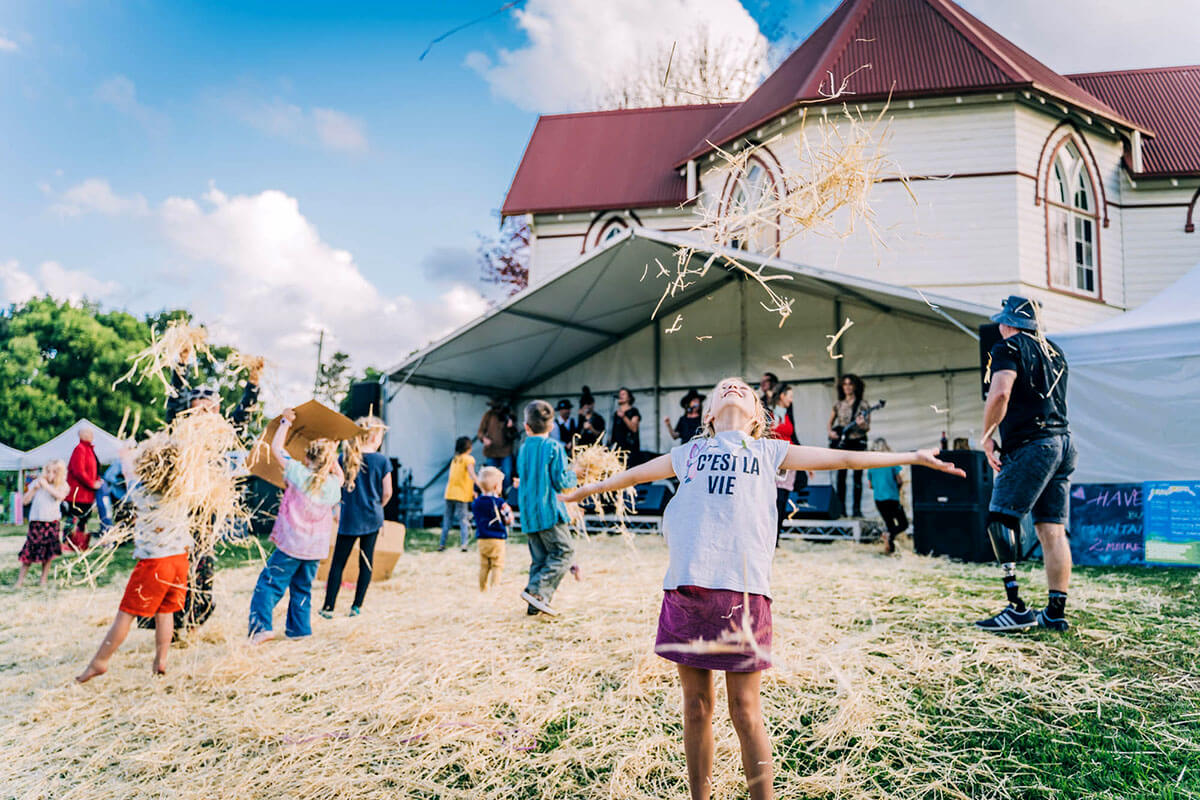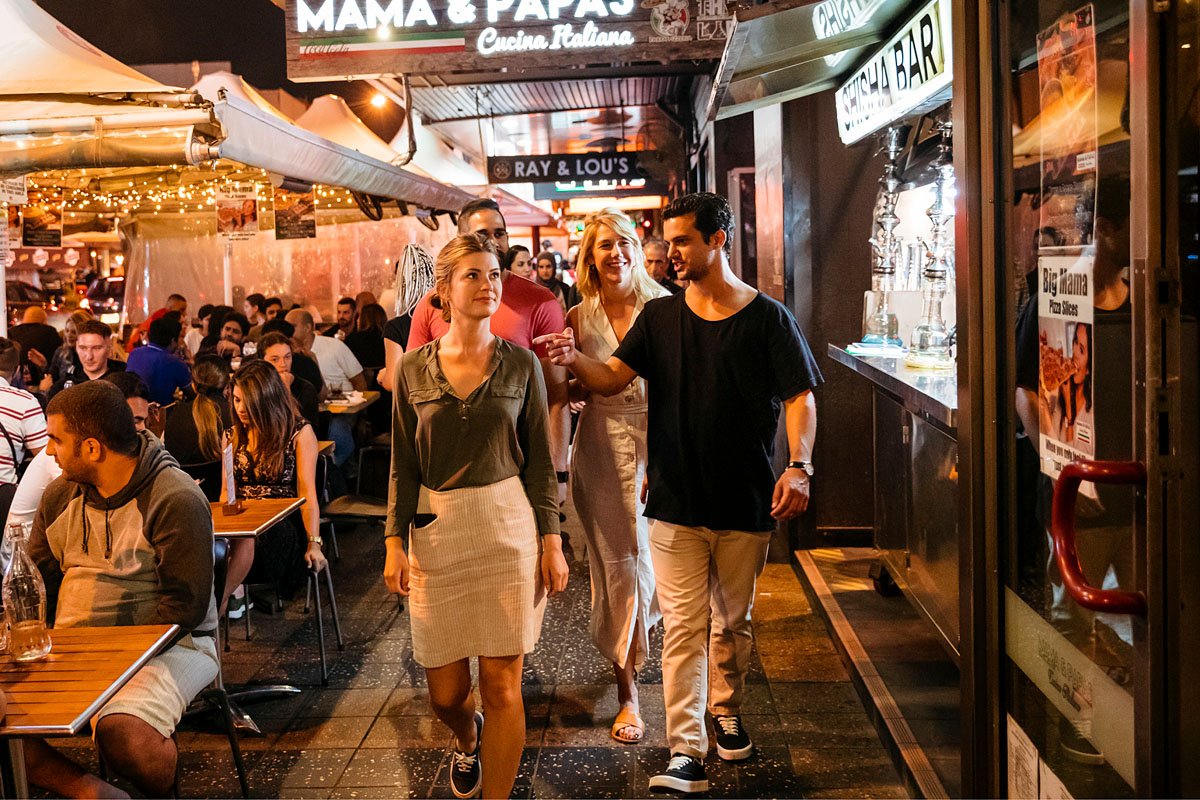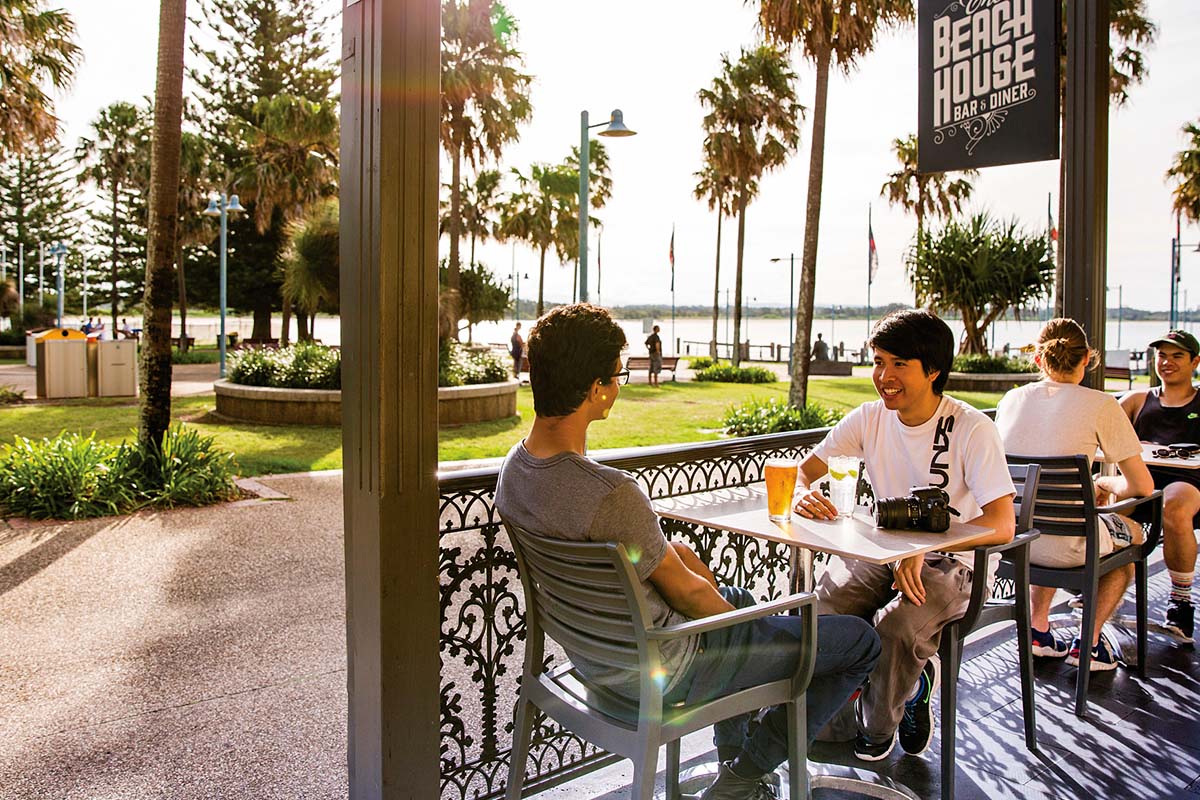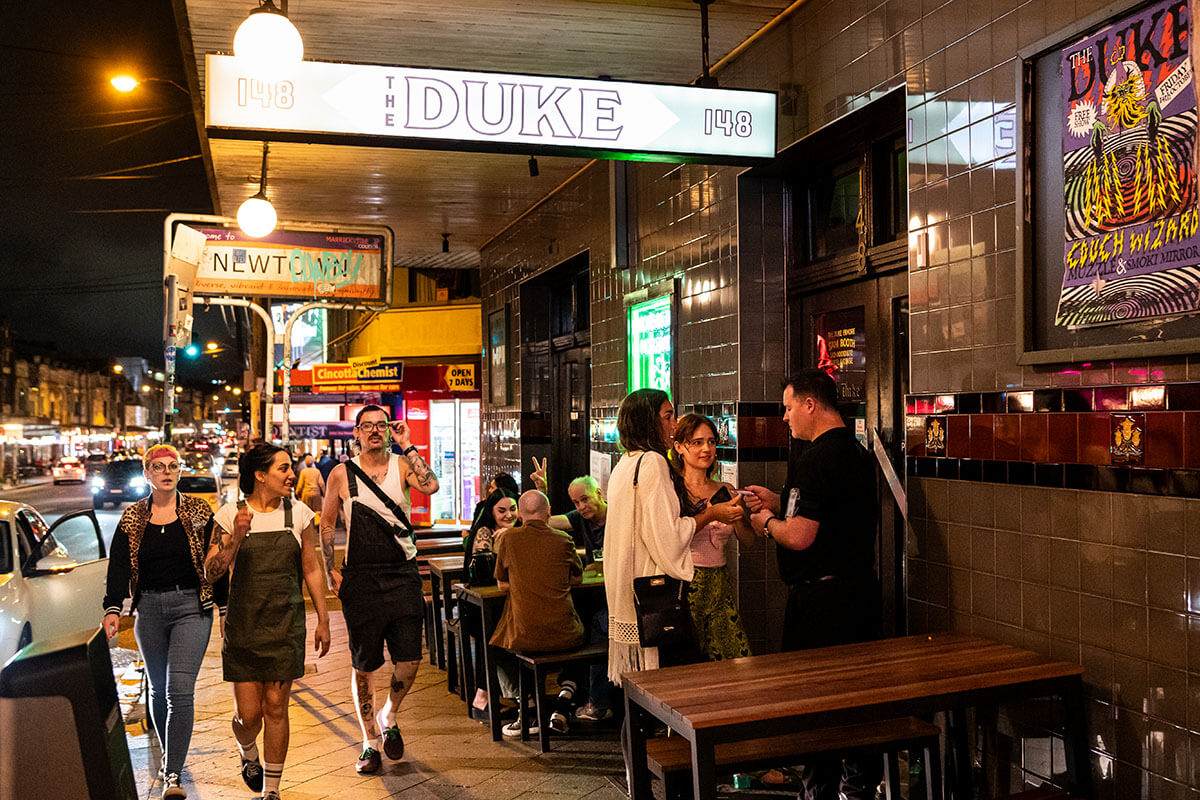We're making it easier for arts, cultural, and hospitality businesses to contribute to local economies and create safe, exciting nightlife in our communities. We are also looking at ways to support our vital night-time workforce whether in hospitality, retail, emergency services or industry.
Vibrancy Reforms
The Vibrancy Reforms are a cross–government initiative developed in consultation with key agencies, industry, councils and stakeholders to bring sector regulation in line with contemporary lifestyle patterns, improve government processes and encourage more people to go out, closer to home.
Cultural State Environmental Planning Policy
The Cultural State Environmental Planning Policy (SEPP) is now in place, a key step to creating a more vibrant night–time economy in NSW.
The Cultural SEPP has been introduced via amendments to the existing State Environmental Planning Policy Exempt and Complying Development Codes 2008 (Codes SEPP), rather than creating a new state policy. This allows the goals of the Cultural SEPP to be achieved through streamlined and faster exempt and complying development pathways.
This means if a proposed activity, such as increasing capacity for outdoor dining, complies with the relevant development standards outlined in the Codes SEPP, then a development application or modification is no longer needed. This will save individuals, businesses, and councils both time and money.
Key changes
Key changes introduced via the Cultural SEPP include:
We’ve expanded the existing exempt development pathway for events and temporary structures on public land. This pathway previously applied to a small number of special major event sites but now applies to all land owned or controlled by public authorities in NSW.
This change will lead to a clearer, more consistent approach to events on public land.
Sydney Opera House and the Australian Botanic Garden Mount Annan are excluded from this change as they already have exempt development frameworks proposed or in place to respond to their specific requirements.
We’ve introduced new exempt development provisions that allow unlicensed venues to access temporary extended trading hours during council–declared special events.
Local councils can declare special events via a council resolution and approve temporary later trading hours for unlicensed venues such as cafes, shops, and takeaway outlets. This will help businesses to trade later and support events such as food and street festivals and moonlight cinemas.
We’ve broadened the range of allowable live entertainment that can be delivered under the exempt development pathway. This allows more live music and arts performances to occur at venues both indoors and outdoors.
Live music and arts are now permitted in residential zones in addition to other zones. To protect local amenity, live performances in residential zones will be no later than 8:00 pm.
We’ve expanded outdoor dining provisions to include farm gate premises and cellar doors.
These changes will support regional and rural economies by showcasing their products and benefitting the tourism industry in NSW.
Food and drink premises with outdoor dining areas on private land or at registered clubs can now increase their specified patron capacity without the need to modify their development consent. Increases permitted as exempt development include:
- a 20% increase if the approved capacity is up to 100 patrons
- a 15% increase if the approved capacity is greater than 100 patrons, capped at a total of 50 additional patrons
- a 30% increase if the venue is in a special entertainment precinct, capped at a total of 100 additional patrons.
The provisions do not override patron limits set by other approvals or regulatory requirements, such as a liquor license, or building code and fire safety requirements. Venue operators are responsible for ensuring compliance with all applicable approvals and requirements.
For more information on the changes and how we’ve responded to the feedback received throughout the public exhibition period, see the frequently asked questions below or visit the NSW Planning Portal.
Vibrancy Guidelines
We’ve prepared the 'Late Night Hours of Operation of Food and Drink Premises' (Vibrancy Guidelines) to provide guidance and support to councils. Under Schedule 8 of the Environmental Planning and Assessment Act 1979 (EP&A Act), councils must consider the guidelines when assessing development applications or modification applications to extend trading hours beyond 7:00 pm for relevant food and drink premises. The guidelines and Schedule 8 are in effect as of 1 November 2025.
Frequently asked questions
Exempt development is a type of low–impact development that does not need planning approval from council. If your activity meets the rules set out in the Codes SEPP, you can go ahead without lodging a development application. This saves time and reduces paperwork.
To use exempt development, you must:
- make sure your activity is listed as exempt development in the relevant planning instrument (such as the Codes SEPP)
- get the landowner’s consent if you are not the owner (such as the council for public land)
- follow all the development standards listed in the instrument – this includes the general requirements and those listed for the individual code and activity
- check if any other approvals are needed under other laws (for example, council permits for road closures or liquor licensing), or if there are any other requirements.
For example, under the Cultural SEPP you can hold a community event on public land as exempt development if it meets the development standards and you have the landowner’s consent. Development standards are mandatory requirements covering things like what type of event is allowed, the size of any temporary structures, and the hours the event can occur.
If your event or activity does not meet all the exempt development standards, you may need to apply for a different type of approval, such as a complying development certificate or a development application. Your council can help you understand which pathway is right for your event.
Possibly. While planning approval may not be required, you might still need permission from the landowner (like council if the development is on public land), or to meet other laws around noise, liquor licensing, and roads (such as road event permits). It's important to check with the relevant authorities before proceeding. Your local council should be the first contact if you’re unsure about what approvals are required for your activity.
No changes to your development consent are needed if you’re using the new exempt provisions. As long as your activity meets the rules under the Codes SEPP, you can use the new options straight away. For example, if a council declares a special event, they will identify the businesses that can temporarily trade later. Individual businesses would not need to apply to modify their development consent.
The Cultural SEPP makes it simpler to hold events on public land across NSW. This includes places like parks, roads and streets, town squares, and other spaces managed by councils or public authorities like state agencies. It also includes buildings, structures, and indoor spaces located on public land.
Before these changes, some councils required event organisers to apply for a development application, which could take time and involve extra costs. The approval pathway and rules also varied between councils, which made it harder to plan events, especially for smaller community groups.
Now, events on public land can be carried out as exempt development if they meet certain standards and are planned in accordance with any management plans or policies for the site. This means you do not need a development application. The new rules apply to all public land, not just a few major event sites. You may still need other approvals, such as council permits, road event permits, or liquor licenses, but the planning process is now more straightforward.
The change makes the process consistent across the state, which helps councils and organisers understand what is allowed.
Associated temporary structures like stages and marquees are also included as exempt development, as long as they meet all development standards.
Unlicensed businesses like shops and cafes can stay open until midnight if the council declares a special event for that area. For example, this could be associated with a local street fair, religious festival, or agricultural show.
Councils can declare a special event with extended trading hours by passing a resolution that identifies which areas, businesses, and events the later trading applies to. This aims to give councils flexibility, support local businesses to take advantage of opportunities, and offer more choice to the community. Business owners would not need to apply for a modification to their current consents to temporarily trade later. Licensed venues (like pubs and bars) are not covered by these provisions. Liquor & Gaming NSW have a separate process to allow extended trading during special events.
No, extended trading during special events under the Cultural SEPP is only for unlicensed premises. Licensed venues are managed separately by Liquor & Gaming NSW, which has its own process for extended trading during special events. Not all events are suitable to be extended to general later trading, for example the screening of an overseas sports fixture at an individual licenced premises.
The Cultural SEPP makes it easier for venues to offer a wider range of entertainment without needing extra planning approval. This includes activities like live music, comedy, theatre, book readings, and other performances. These can now take place as exempt development, meaning no development application is needed, as long as the activity follows the rules.
Entertainment can now happen both indoors and outdoors. Previously, outdoor performances were not allowed without approval. The new rules allow entertainment outside, such as in courtyards or gardens, but not on rooftops. Entertainment is also now permitted in all zones, including residential areas, which was not allowed before.
To protect local amenity, there are limits on when entertainment can take place in:
- residential zones, entertainment must finish by 8:00 pm
- zones next to residential areas, it must finish by 10:00 pm
- all other zones until midnight.
Entertainment can only occur up to two times per week, from Monday to Sunday. These changes support a more vibrant and diverse night-time while balancing the needs of nearby residents.
The reforms allow for entertainment to occur twice per week (without council approval) in outdoor areas until 8:00 pm in residential zones. Residents are still able to make a complaint to Liquor & Gaming NSW about the noise if it creates a significant disturbance.
As an exempt development pathway, all development standards must be complied with. The venue would need to submit a development application if it wanted to host more impactful or frequent entertainment, which would involve community consultation.
Many hospitality venues can now welcome more patrons than before thanks to changes introduced in the Cultural SEPP. These changes apply to venues with a maximum patron capacity specified on their development consent and that provide outdoor dining on private land, like food and drink premises, and registered clubs. They are designed to support local businesses while maintaining safety and amenity.
If your venue has outdoor dining and meets the development standards, you may be able to increase your total patron capacity without needing to modify your development consent. The amount of increase depends on your current approved capacity:
- If your venue is approved for up to 100 patrons, you can increase by up to 20 percent.
- If your venue is approved for more than 100 patrons, you can increase by up to 15 percent, with a maximum of 50 additional patrons.
- If your venue is in a Special Entertainment Precinct, you may be able to increase by up to 30 percent, with a maximum of 100 additional patrons.
These increases are only allowed if your venue complies with all relevant development standards in the Codes SEPP and some venue types are excluded. Venues can’t reduce required car parking to make room for more patrons.
The provisions do not override patron limits set by other approvals or regulatory requirements, such as a liquor license, or building code and fire safety requirements. Venue operators are responsible for ensuring compliance with all applicable approvals and requirements.
This change helps businesses make better use of outdoor spaces and respond to customer demand, especially during busy periods or special events. If the venue is a licensed premises, it will also need to seek approval from Liquor & Gaming NSW for any changes to its licensed boundary.
No. The new exempt development provisions allow venues to increase patron capacity beyond what is permitted under an existing development consent. However, these provisions do not override patron limits set by other approvals or regulatory requirements.
For example, a small bar with a liquor licence that limits patron numbers to 100 must continue to comply with that licence condition, even if exempt development provisions would otherwise allow a higher number. Similarly, venues must comply with any patron limits imposed by the National Construction Code, fire safety regulations, or other relevant approvals.
Venue operators are responsible for ensuring compliance with all applicable approvals and requirements. The exempt development provisions simply remove the need to lodge a new DA or modify an existing development consent, but they do not affect other binding conditions.
In practice, this means the maximum number of patrons permitted at a venue is determined by the lowest applicable limit across all relevant approvals and requirements, other than for a development consent that can be overridden under the new provisions in the Codes SEPP.
The increases in patron capacity for outdoor dining were chosen to balance the needs of businesses looking to maximise use of their outdoor spaces without onerous approval pathways, and safety and amenity considerations. The number of people in a venue has an impact on noise, use of facilities such as toilets, and accessibility concerns. That is why the number of additional people permitted is based on the size of the venue with sensible caps to ensure the impact on safety and amenity is minimised.
Special Entertainment Precincts are a tool for councils to help unlock the potential of their night-time economies. They empower councils to designate areas where councils can set trading hours and sound conditions to encourage live performance and support vibrant going-out precincts.
To establish a Special Entertainment Precinct, councils need to undertake extensive community consultation and prepare a range of documents for assessment by several state agencies, including the Department of Planning, Housing and Infrastructure, NSW Police, Liquor and Gaming NSW, and the Office of the 24–Hour Economy Commissioner. Given this level of oversight and the aim of councils to support vibrancy, increase activation, and commit to working with communities to establish the right settings, greater incentives for businesses are proposed in Special Entertainment Precincts. These include higher patron capacity increases for outdoor dining.
Yes, the Cultural SEPP now allows outdoor dining as exempt development at farm gate premises, including cellar doors and other agritourism venues. This means farm gate businesses can offer outdoor dining without needing an additional development application, as long as they meet the relevant standards.
This change helps ensure consistency with similar land uses and removes unnecessary barriers for regional operators. It supports tourism and hospitality in rural and regional areas by allowing producers to showcase their local products and make it easier for visitors to enjoy food and drink experiences in outdoor settings.
The Vibrancy Guidelines for Late Night Hours of Operation of Food and Drink Premises is a new tool created to help councils make consistent decisions about late–night trading for certain food and drink venues. It provides clear advice on how to assess applications for extended trading hours, especially in areas where councils wish to encourage late-night activity. The Vibrancy Guidelines are part of the broader Vibrancy Reforms, but they do not cover all the changes. The Guidelines specifically relate to how councils assess development applications identified in Schedule 8 of the EP&A Act for certain food and drink premises that want to trade later at night.
The Vibrancy Guidelines are in effect from 1 November 2025.
The Department’s Planning Pathways for Community Events guide (Events Guide) is a practical resource to help councils and event organisers understand how to plan and deliver community events on public land and local streets. The guide will be published before the end of 2025.
The guide explains the different planning pathways available, including when an event can be held without needing a development application. It also outlines how to use the new exempt development provisions introduced through the Cultural SEPP which allow events and temporary structures on public land without formal planning approval, if certain standards are met.
The goal is to make the planning system more accessible, to encourage activation of public spaces, while ensuring safety, amenity, and consistency across NSW.
The Cultural SEPP also introduced updates to make planning rules more practical and supportive of local businesses and communities.
Bike racks and lockers
It is now easier to install bicycle racks and lockers at existing premises. These can be added under exempt development, meaning no development application is needed as long as the installation meets safety and design standards. This supports active transport and makes it easier for businesses and residential buildings to provide secure bike storage.
SP4 Enterprise Zones
The SP4 Enterprise Zone will be included as a business zone for the purposes of selected provisions in the Industrial and Business Buildings Code, allowing change of use and internal alterations to take place as complying development. This will make low-impact fit-outs and tenancy changes easier, helping to activate underused space in strategic employment areas.
Filming
A previous change to the Codes SEPP in July 2025 increased the maximum number of days filming could occur on private land as exempt development, from 30 to 90 days, within a 12–month period. At the time, this was not reflected for filming-associated temporary structures or building works. We are addressing this so these related activities are now covered, to support NSW’s growing screen industry and creative sector.
The Cultural SEPP is part of a broader commitment under the NSW Government’s Vibrancy Reforms. There is a strong role for the planning system to play in supporting vibrancy in NSW, by making planning frameworks more supportive of culture, hospitality, and night-time activity. We’re continuing to explore further changes to help communities thrive and make the most of their spaces.
Changes to development consent conditions
The NSW Government has made changes to certain entertainment conditions in development consents. These changes were made in collaboration with the music and cultural sectors and will support a thriving and vibrant night-time economy.
These changes passed Parliament on 19 November 2025.
From 1 December 2025, some development consent conditions at licensed venues were automatically ‘switched off’. These include certain conditions that restricted live music or entertainment and imposed sound limits or acoustic controls at licensed premises.
The following types of conditions no longer apply at any licensed premises after 1 December 2025:
- Prohibitions on specific music genres
- Restrictions on the number or types of instruments
- Limits on the number of musicians
- Requirements to play original or cover music
- Restrictions on dancing or the presence of a dancefloor
- Conditions about the direction a stage faces
- Prohibitions on decorations, such as mirror balls and lighting.
In addition, for hotels, clubs, and small bars only, any conditions that prohibit “live music” or “live entertainment” are also switched off.
These changes don’t apply to:
- State significant developments determined by the Minister for Planning and Public Spaces
- Complying development consents.
There has been no change to how noise is managed for unlicensed venues.
These changes are part of the NSW Government’s Vibrancy Reforms and follow the 2024 reforms to entertainment noise management at licensed venues in NSW. Learn more about the reforms to venue sound management regulation.
You can also visit the Liquor and Gaming NSW website for further information.
Frequently asked questions
No. The conditions were automatically switched off from 1 December 2025. They can remain in the consent but will have no effect. However, it’s important to note separate conditions (e.g. operational noise limits, hours of operation, liquor license requirements) may still apply.
Current consents don’t need to be updated as the relevant conditions are now automatically invalidated. Councils may choose to update internal systems, processes, or templates to reflect the changes. Councils may also wish to update any relevant guidance material to ensure landowners and venue operators are properly informed.
From 1 December, new conditions imposed by councils at licensed premises will not have effect if they relate to any of the following matters:
- the specific music genres allowed
- the number or types of instruments allowed
- limits on the number of musicians
- requirements to play original or cover music
- restrictions on dancing or the presence of a dancefloor
- the direction a stage faces
- the use of decorations, such as mirror balls and lighting.
Additionally, clause 5.20 of the Standard Instrument Local Environmental Plan provides that councils can’t refuse applications on the above grounds. They also can’t refuse a proposal to stage music performances at licensed premises if the noise can be managed to an acceptable level.
Yes. The condition ‘switch off’ applies to development consents, as well as any plans of management you’re required to comply with as a part of that consent. This means certain entertainment-related conditions in your plan of management will no longer apply. Other conditions will still be in effect.
For any new development application lodged with your local council, you can still make submissions to express any concerns you may have. Councils can’t refuse a development application for proposing live entertainment or apply the listed ‘switched off’ condition types. However, they can still impose other conditions to mitigate disruptions.
Should entertainment-related noise issues arise at a venue that has had their noise condition removed, a new power has been introduced to allow Liquor and Gaming NSW to reimpose that condition or apply a more suitable one up to three years after the removal of the original condition.
Liquor and Gaming NSW will continue working closely with industry to ensure licensees understand their obligations. Despite these conditions being switched off, licensees must continue to minimise disturbances to nearby residents and businesses and maintain the quiet and good order of the neighbourhood. You can read more about this on Liquor and Gaming NSW's website.
Regulation around noise, planning and liquor licensing has been updated and simplified through the NSW Government's Vibrancy Reforms.
Liquor and Gaming NSW are the lead regulators of entertainment sound for licensed premises. Raising an issue with the venue manager is the most effective and fastest way to resolve issues related to live entertainment. If you’re unable to reach a reasonable outcome, you can make a noise complaint with Liquor and Gaming NSW. Liquor and Gaming NSW can investigate persistent issues and take action in line with their Compliance and Enforcement Policy.
We have more information on managing noise in the Noise Management section below.
Yes. Conditions and other regulations unrelated to entertainment (e.g. noise such as noise from heating, venting, and air conditioning units, trading hours, patron limits) remain enforceable. Since 1 July 2024, changes introduced by Vibrancy Reforms provide more favourable noise management requirements for venue operators. Find out more about how the changes effect development consents for licensed premises in the Noise Management section below and Planning Circular PS 24-003.
24–hour Economy Strategy
In September 2024, the NSW Government refreshed the 24–hour Economy Strategy. We will help deliver the strategy by providing the planning framework to activate spaces, create vibrant places to work and live, better align planning and liquor approvals, and streamline processes.
Noise management
Regulation around noise, planning and liquor licensing has been updated and simplified through the NSW Government's 24–Hour Economy Legislation Amendment (Vibrancy Reforms) Act 2023 and the 24–Hour Economy Legislation Amendment (Vibrancy Reforms) Act 2024. This means venues in NSW will have the opportunity to reach their full entertainment, economic and creative potential – especially at night.
Since 1 July 2024, changes introduced by Vibrancy Reforms provide more favourable noise management for venue operators. Find out more about how the changes effect development consents for licensed premises in the frequently asked questions and Planning Circular PS 24-003.
Frequently asked questions
Under the Vibrancy Reforms, certain noise-related conditions on licensed venues’ development consents cease to have effect.
Conditions which ceased to have effect for all licensed premises relate to:
- the way in which the business of the licensed premises is conducted, such as:
- decibel limit-based sound controls, such as the LA10 noise criteria
- the provision or cessation of live / amplified music or sound entertainment at specific times
- use of a noise limiter
- placement and use of speakers.
- noise arising from the behaviour of persons after they leave the licensed premises – this includes anti-social behaviour or alcohol–related violence.
Further changes, as outlined in Schedule 5 of the 24–Hour Economy Legislation Amendment (Vibrancy Reforms) Act 2024, will commence in 2025.
No. All conditions of development consent that relate to the above automatically ceased to have effect from 1 July 2024. Licensed venues and councils are not required to take any action to implement this change, for example a modification application to remove a condition is not needed.
No. The complaint reforms apply only to licensed premises (i.e. premises with a liquor licence). Councils will continue to manage noise complaints about unlicensed premises.
If you have concerns about the level of noise generated by a licensed venue, such as noise from amplified music, entertainment or patron noise, you can lodge a complaint via the Liquor & Gaming NSW online portal.
Refer to Liquor & Gaming NSW for more information about the complaint process, including advice about speaking to the venue and making a formal complaint.
Liquor & Gaming NSW and the NSW Police deal with noise complaints related to entertainment. Councils are not responsible for this. Refer to Liquor & Gaming NSW for more information.
Councils are no longer responsible for responding to noise complaints related to entertainment noise at licensed premises.
Councils can refer any new noise complaints related to entertainment at licensed venues to Liquor & Gaming NSW.
Councils should continue to assess development applications for licensed venues and apply conditions of consent as usual, even though they will not take effect.
Go to Liquor & Gaming NSW to read the disturbance complaint guidelines for licensed premises.
Find out more about the complaint process in Liquor & Gaming NSW’s overview of reforms to the regulation of venue sound management.
Liquor Amendment Act
The NSW Liquor Amendment (Night-time Economy) Act 2020 supports councils' ongoing work to develop a vibrant, safe and modern night-time economy across NSW.
The Liquor Amendment Act made several changes to planning legislation that effect council processes and procedures. Learn more about the Liquor Amendment Act 2020 changes to planning instruments – Information for consent authorities (PDF, 141 KB).
We’ve made changes to bring more live music, arts venues and artisan food and drink businesses to the streets of NSW.
Here’s advice for opening a business that contributes to the night-time economy.
NSW has the perfect climate for outdoor dining, bringing life to our streets and public spaces.
Councils can formally establish a special entertainment precinct in their local area.
